As a new or prospective boat owner, you may find yourself wondering, do you need boat insurance? State requirements could make this a hard “yes,” but there are some other factors that will help you decide whether you need boat insurance.
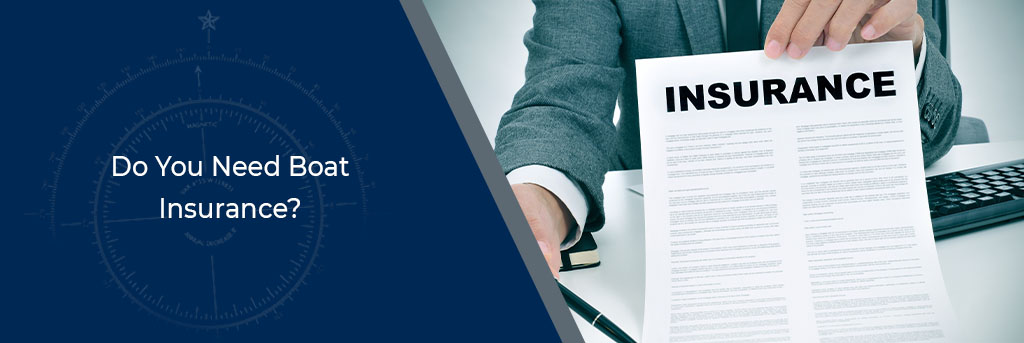
Do you have to buy insurance for a boat?
There are a few reasons why you may need to buy insurance for your boat.
Your state requires boat insurance
Just like auto insurance, boat insurance requirements vary state by state.
Arkansas, Utah, and Hawaii are the only three states that have boat insurance requirements.
- Arkansas requires liability insurance with a minimum of $50,000 in coverage for all boats with an engine of 50 horsepower (HP) or more.
- Utah boat insurance requirements include bodily injury, death, and property damage for all boats with an engine greater or equal to 50 HP. Utah boat insurance policy limits include $25,000/50,000 for bodily injury/death and $15,000 for property damage or a $65,000 combined minimum per accident.
- Hawaii only requires insurance for boats parked in the Department of Land and Natural Resources Division of Boating and Ocean Recreation (DOBOR) facilities, including harbors and offshore moorings. Boats matching this criterion must have at least $500,000 in liability coverage. Insurance policies must name the State of Hawaii, DOBOR as an “additional insured” or “additional interest” Boat insurance policies in Hawaii should cover salvage costs for grounded or sunken vessels, damage to docks, pollution containment, and wreck removals.
Your marina requires boat insurance
If you live in a state that doesn’t require boat insurance, that doesn’t necessarily mean you don’t have to get insurance for your boat. Many marinas and ports have their own regulations and may require you to have boat insurance to use their facility. If you are planning on docking or storing your boat at a marina, you should consider purchasing insurance for your boat.
You are financing your boat
If you are financing the purchase of your new boat, the bank may require you to show proof of insurance. Your insurance policy will likely need to cover the full value of the boat. The bank may also set minimum requirements for specific types of coverage. Check with a lender about the coverage requirements. When obtaining an insurance policy on a boat that you are financing, you will need to list the bank as a lienholder on the insurance policy. This will ensure the bank is included as a co-payee in the event of a loss payout.
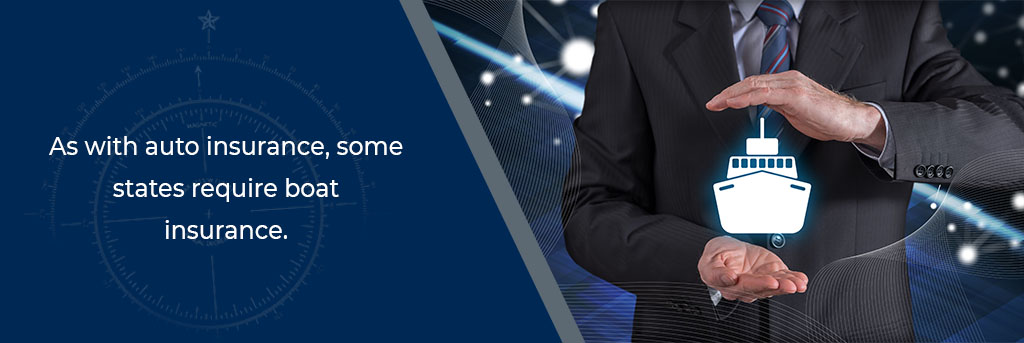
Should I insure my boat if it’s not required?
Even if boat insurance is not required by your state or marina or financial institution, you may want to consider purchasing some type of boat insurance. Boat insurance is meant to protect you and can help you in the event your vessel is damaged or if harm is caused to another human being with your boat or on your boat.
Boat insurance covers:
- Damages to the boat or personal property on your boat.
- Liability coverage in the event of a boating accident and harm is caused to others
- Medical coverage if you or a guest is injured on the boat
- Uninsured boat owners’ coverage if your boat is damaged or anyone is injured by another boat that is uninsured.
- Towing costs
Whether it’s damaged while docked at a marina or during an accident, boat damage can certainly be costly. Although there is a deductible, boat insurance can help save you from having to pay the total cost of the damage.
What Type of Boat Insurance Should I Get?
When it comes to insuring your watercraft, policies are not one size fits all. Insurers often classify bay boats, particularly hybrid bay boats as either boats or yachts. Boats 26 feet and smaller would fit under a “boat” policy. While vessels 27 feet and larger would need a yacht policy. So, if you had a Crevalle 24 HCO, 26 HCO or 26 HBW, you would get a boat insurance policy. If you have a 33 CSF, you will need a policy for a yacht. Yacht coverage is often broader and more specialized for larger boats that travel further into the waters.
If you are a professional angler or use your boat to conduct guides and charters, you may need a more customized policy. The Professional policy may cover more items like travel to tournaments or special equipment.
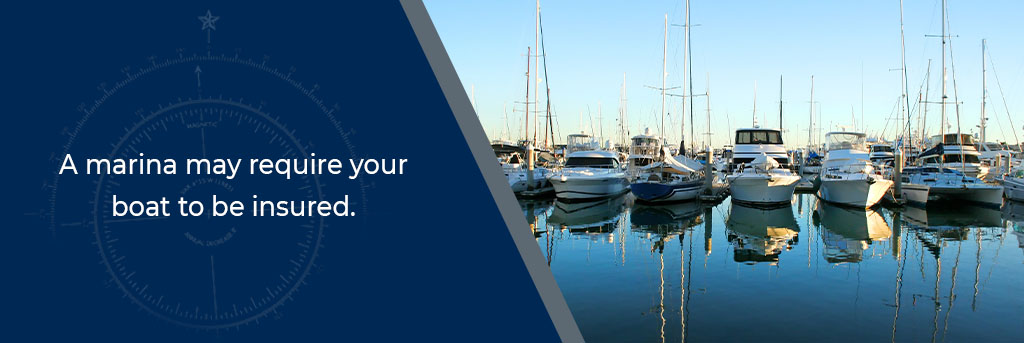
What Boat Insurance Coverage Options Do I need?
Agreed Upon vs. Actual Cash Value
In terms of damage reimbursement, you may need to choose between “Agreed Value” and “Actual Cash Value”. These policies use cost and depreciation to determine how much payout you will receive in the event of damage to your boat. “Agreed Value” policies cover the boat based on the value at the time the policy was written. “Actual Cash Value” policies will pay up to the actual cash value of the boat at the time it is declared a partial or total loss. “Agreed value” policies cost more up-front, but you will receive a larger payout. “Actual Cash Value” policies are cheaper upfront, but you will receive less money if your boat has been declared a loss after depreciation.
After several years of an “Agreed Value” policy, your insurer may suggest you switch to an “actual cash value” policy. This can give you substantial savings on your policy, but you will receive less money in the event of substantial damage.
All-Risk Policies
All Risk policies offer the best protection. However, the name can be slightly deceiving. You will likely want additional coverage. “All risk” is an insurance term that refers to “any risk not specifically omitted in the policy”. This excludes wear and tear, denting, freezing, among other types of damage. You may want to add medical payments, uninsured boaters’ liability, towing, and personal effects. Most policies will cover equipment that is attached to your vessel, including anchors, trolling motors, oars, seat cushions, tools, and life jackets. Boat insurance policies may differ by the insurer, so please confirm coverage with your agent.
Named Perils vs. All Perils
If you live in Florida, home of Crevalle Boats boat manufacturer, you will also need to evaluate an “All Perils” vs. “Named Perils” policy. A Named Perils insurance policy only provides coverage for events or “perils” named specifically in the policy. An “All Perils” policy can provide coverage if your boat is damaged as a result of any event (except for those explicitly excluded in the policy). Insurers may require you to provide evidence of risk mitigation to qualify for an “All Perils” policy.
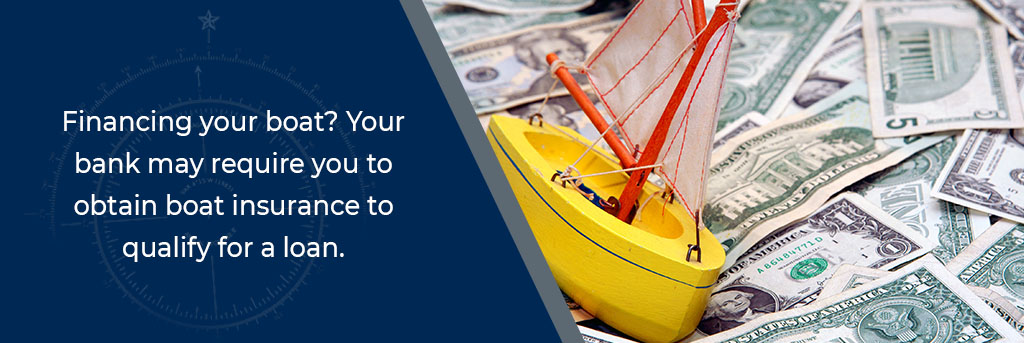
How Much Does Boat Insurance Cost?
The cost of boat insurance can vary state by state, but there are some general factors that can determine the cost of your boat insurance policy.
Boat insurance cost may be determined by:
- The value of your boat
- The size of your boat
- Horsepower
- The type of vessel
- Where your boat is stored
- How often your boat is used
- What your boat is used for
If you live in Florida, the amount of time you spend in Florida can also be a factor in determining the cost of your boat insurance. Part-time residents who don’t regularly use or monitor their boats are considered high-risk because they may not be around to take property precautions to prevent damage, should a hurricane or another event occur.
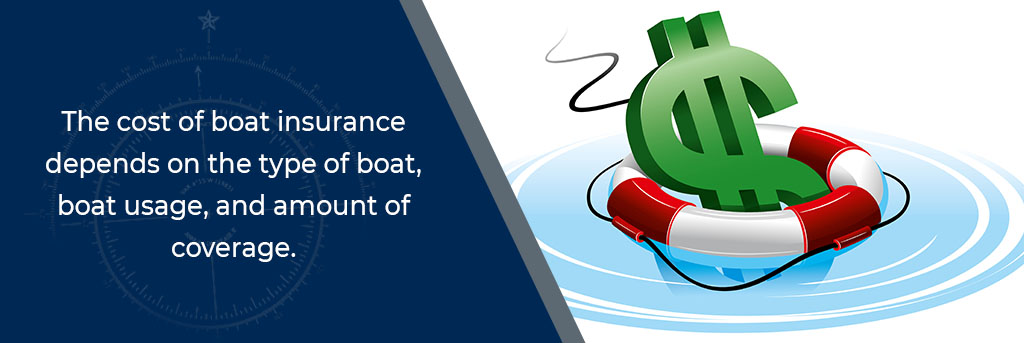
Reducing The Cost of Your Boat Insurance
Boat insurance may seem like an added expense, especially in Florida where boat insurance is higher than in other states. But boat insurance is important, and the potential expenses of a total loss or personal liability can be far greater if you’re uninsured. Consider these tips if you’re looking to save money on boat insurance.
- Get coverage that meets your needs: Talk to your agent to make sure you have enough coverage and see what you can forgo.
- Bundle: If you insure your boat, automobile, and home with the same insurer, you will likely be eligible for a multiline discount.
- Safe driving discounts: Just like with auto insurance, you may be eligible for a discount If you have no boat accidents and violations on your record.
- Take safety courses: You may be eligible for a discount by completing a qualified safety course.
- Get safety equipment: Insurers may offer you a discount if you can prove that you have specific safety gear on board your boat, including a First Aid Kit and other safety equipment.
- Raise your deductible: This will lower your monthly premium and may save you more money over time
- Don’t file small claims: Filing too many claims can result in an increased premium. Save the more expensive damages for insurance claims.
- Layup periods: Not using your boat during the cold months? Ask about a winter layup option, which can lower your premiums during the months that you’re not using your boat.
We may be boating experts at Crevalle, but we are not insurance or liability experts. For more information about boating insurance, contact a local boat insurance agent to find a policy that works best for you. For more boat owners’ resources, register your Crevalle and follow us on Facebook. Read our tips for winterizing your boat to help protect your boat from cold weather damage.






